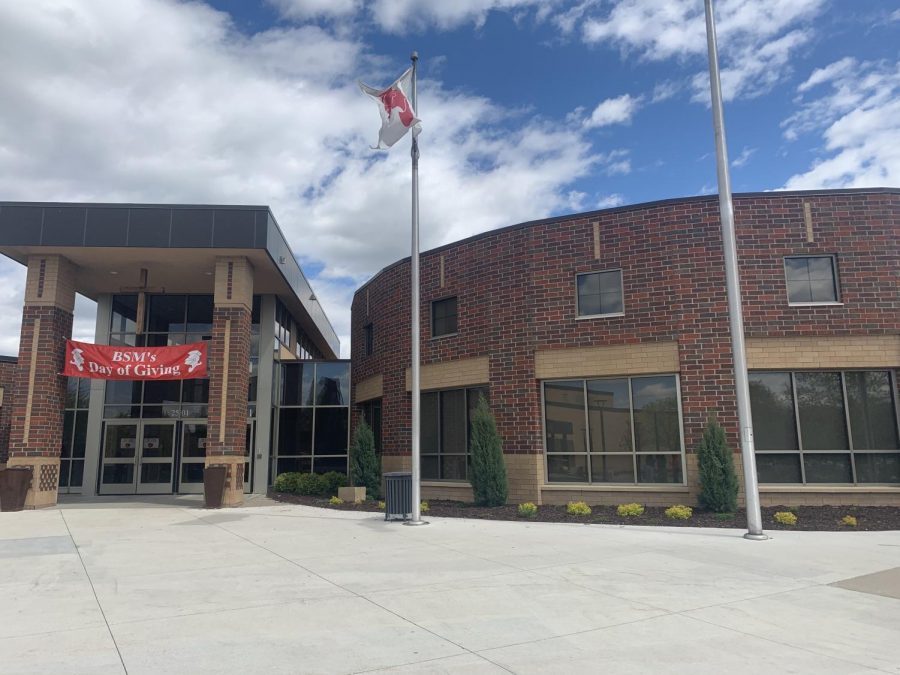BSM’s EIB plan, explained
This year BSM has created a plan for creating greater equity, inclusion, and belonging at the school.
In August of 2020, Benilde-St. Margaret’s administration began the long process of forming a Diversity, Equity, and Inclusion (DEI) plan. Since then, the name of the plan has been changed to the Equity, Inclusion, and Belonging (EIB) plan. The intention of such a plan is to help all students, regardless of race or ethnicity, thrive in the BSM community. The plan is by its nature an administrative proposal. For many students, it’s a bit difficult to digest. With this in mind, the Knight Errant offers this translation for ease of understanding.
Following the completion of preliminary assessments, a five-year strategic EIB plan was formed. The EIB plan is part of the wider five-year plan for BSM. The general plan consists of four pillars: Exceptional Academics, Being Catholic in the World, Vibrant Community, and Investing in the Future.
The EIB plan is based on “The Christian Response to Racism,” which is outlined on the Archdiocese of Saint Paul and Minneapolis website. A multi-year EIB plan that follows this teaching is still being developed. It will also rest on four pillars: Student Empowerment, Faculty/Staff Engagement, Administrative Stewardship, and Community Fellowship. Although the full plan is not finalized, some portions are known.
Much like the preliminary assessments, the plan focuses on parents, students, and teachers. Parents have two ways to get involved: the EIB school board committee, which is the BSM school board’s subcommittee to address racism and intolerance in school. Parents can also join a parent affinity group, which will meet quarterly to discuss the EIB plan at BSM.
Students are the focus of the plan. Since 2016, the option to join a student affinity group has existed. Both junior and senior high students have individual groups available to them. These meetings are controlled by ambassadors of the student advocate program, which trains upperclassmen to lead affinity meetings, help first-generation college students, and organize quarterly parent meetings.
All three groups come together with new diverse learner support and training. This provision is not specifically aimed at students of color, but it is still a highly beneficial program that helps with equity for students with learning difficulties. Student mentoring programs, parent affinity groups, assistive technology, and learning specialists all help struggling students reach their full potential.
This set of policies was based on the preliminary phase of the plan. Between August of 2020 and February of 2021, administration took assessments of the BSM community to determine what action was necessary. These conversations included students, teachers, parents, and alumni.
In August of 2020, teachers attended professional development workshops aimed at fostering an inclusive environment. Similar meetings were held in September and October of 2020.
In September of 2020, the first student focus group was held. These groups continued throughout the year. Some consisted of general samplings of the population; others were made up of only ‘student leaders.’ Groups were also organized for the 7th and 9th grade class (in August and October, respectively) that focused on the use of inclusive language. In December of 2020, new Principal’s Advisory Groups were formed to orchestrate continued conversations between students and administrators.
Parents and alumni had a chance to get involved in November of 2020 with the organization of two Town Hall meetings. Parents of students of color had gotten a chance to voice their opinions earlier in the year, when they met with EIB consultant Kendra Dodd in October of 2020.
The most meaningful structural change found in the preliminary plan happened in October of 2020, when BSM connected to a local student-teaching program to bring more diverse faculty members into the BSM community.






































![Teacher Lore: Mr. Hillman [Podcast]](https://bsmknighterrant.org/wp-content/uploads/2025/03/teacherlorelogo-1200x685.png)




